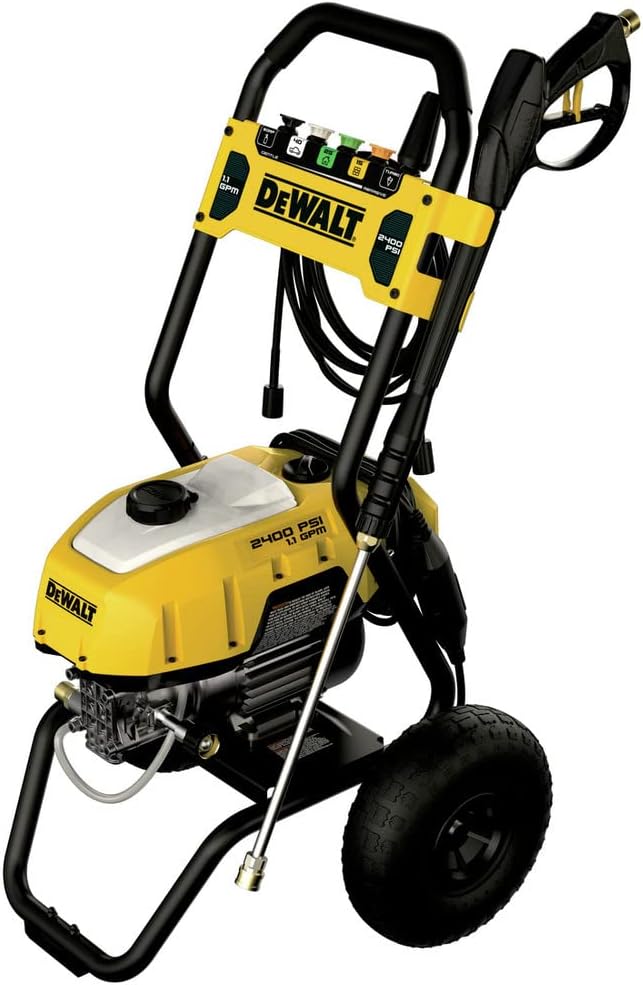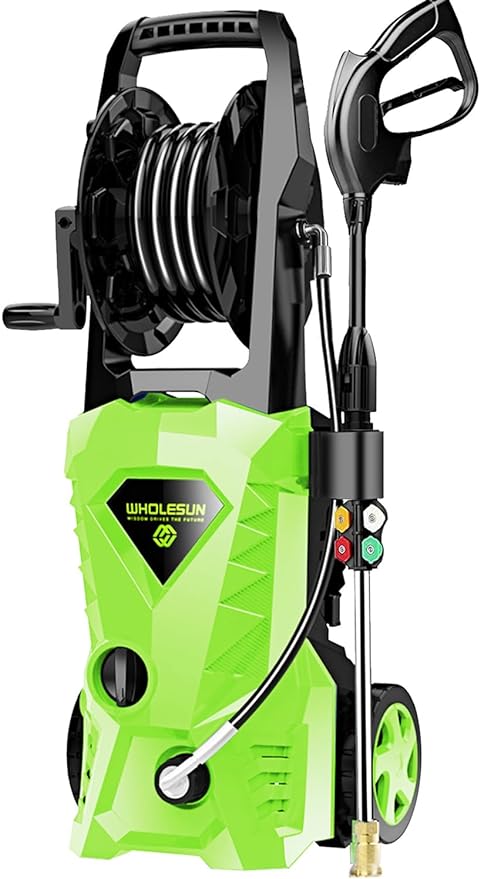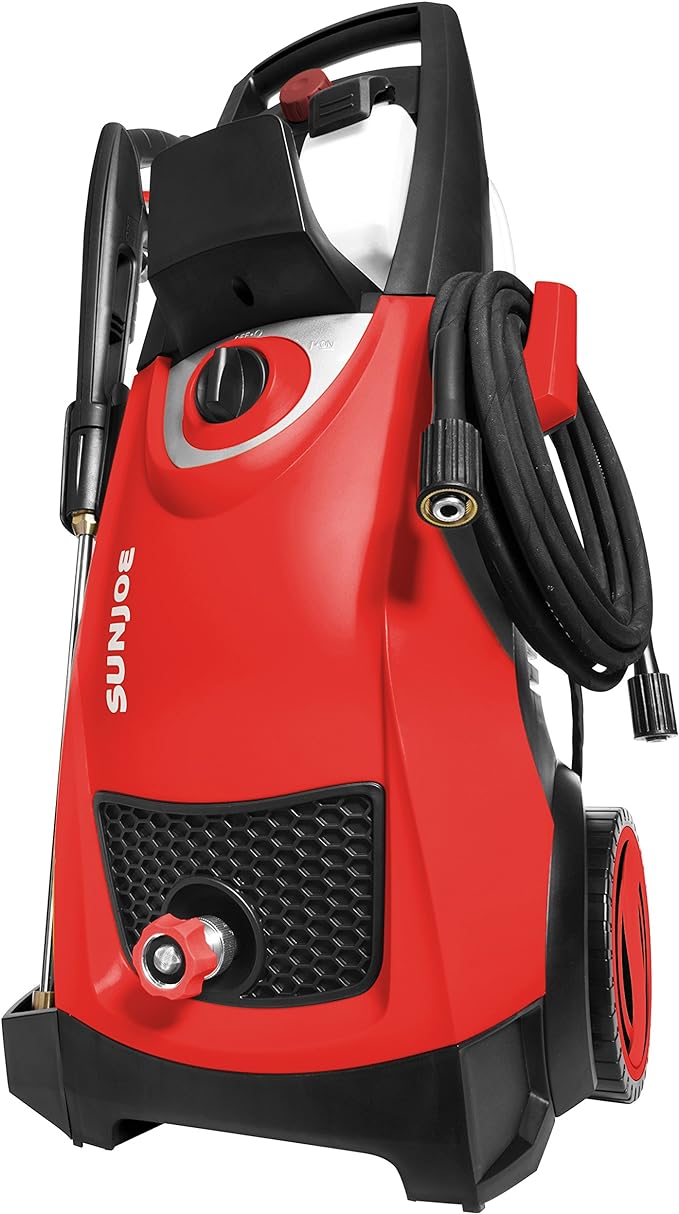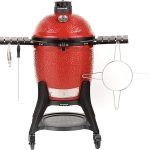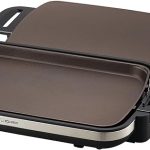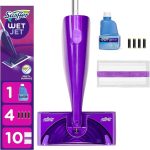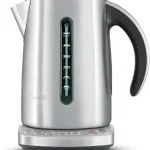You’re in the market for a reliable pressure washer to tackle those stubborn outdoor messes. You’ve got options, but which ones are worth your hard-earned cash? Let’s cut to the chase – you need a model that can deliver on power, performance, and ease of use. Among the top contenders are the DEWALT, WHOLESUN, and Sun Joe pressure washers, each boasting impressive specs and unique features. But which one is right for you? The answer depends on your specific cleaning needs – and we’re about to break it down for you.
Contents
DEWALT Electric Pressure Washer, 2400-PSI
The DEWALT Electric Pressure washer is an excellent choice if you’re looking for a reliable and powerful electric pressure washer for heavy-duty cleaning tasks.<|start_header_id|><|start_header_id|>assistantassistant
Its 2400 max psi and 1 GPM make it well-su<|start_header_id|><|start_header_id|><|start_header_id|>
The integrated soap tank with pressure washer gun makes it easy to switch between cleaning solutions
Best For: Heavy-duty cleaning tasks, such as cleaning driveways, sidewalks, and large equipment, where high pressure and flow rate are necessary.
Pros:
- High pressure and flow rate (2400 psi and 1.1 gpm) for efficient cleaning
- Integrated soap tank and on-board storage for convenience and organization
- Long power cord and hose, and premium pneumatic wheels for easy transport and maneuverability
Cons:
- Some customers have reported issues with the wand support design and hose quality
- A few customers have experienced problems with the pump performance and leakage
- There have been reports of defective products, including one that would not turn on due to a faulty GFCI
WHOLESUN 4000PSI Electric Pressure Washer
The WHOLESUN 4000PSI Electric Pressure Washer is the perfect choice for homeowners and DIY enthusiasts who need a reliable and efficient cleaning solution for tackling tough outdoor cleaning tasks.
With its impressive 4000 PSI and 2.8 GPM power, you’ll appreciate the versatility of this pressure washer, which comes with 4 quick-connect nozzles and adjustable pressure settings to help you tackle a variety of cleaning jobs.
The 22mm metal spout and 33ft high-pressure hose make it easy to connect and use, while the total stop system and GFCI guarantee reliable performance and safety.
With its compact and lightweight design, you’ll find it easy to maneuver and store when not in use.
Plus, with a 2-Year Limited Warranty and 24/7 Tech Support, you can have confidence in your purchase.
Best For: Homeowners and DIY enthusiasts who need a reliable and efficient cleaning solution for tackling tough outdoor cleaning tasks.
Pros:
- Impressive 4000 PSI and 2.8 GPM power for effortless cleaning
- Versatile performance with 4 quick-connect nozzles and adjustable pressure settings
- Compact and lightweight design for easy maneuverability and storage
Cons:
- Some users have reported issues with wheel quality
- Hose length may be too short for some users
- Storage cradle could be improved
Sun Joe Electric Pressure Washer
The Sun Joe Electric Pressure Washer is an ideal choice for homeowners who need a reliable and versatile cleaning solution.
Its powerful 14.5-Amp/1800-watt motor delivers up to 2030 PSI of water pressure and 1.76 GPM of water flow.
This electric pressure washer is designed to tackle various cleaning tasks with ease, featuring two 0.9 L onboard detergent tanks for simultaneous use of different detergents.
The 34′ extension spray wand, rear wheels, and five quick spray nozzles make it easy to maneuver and access hard-to-reach areas.
Plus, the TSS trigger automatically shuts off the pump when not in use, saving energy and prolonging the pump’s lifespan.
With its impressive performance and convenient features, the Sun Joe Electric Pressure Washer is a great option for your cleaning needs.
Best For: Homeowners who need a reliable and versatile cleaning solution for various tasks.
Pros:
- Powerful 14.5-Amp/1800-watt motor delivering up to 2030 PSI of water pressure and 1.76 GPM of water flow
- Convenient features such as two 0.9 L onboard detergent tanks, 34′ extension spray wand, rear wheels, and five quick spray nozzles
- Energy-saving TSS trigger that automatically shuts off the pump when not in use
Cons:
- Some reviewers mention issues with the assembly instructions
- Problems with the water hose connector reported by some users
- No additional information provided about the warranty and support beyond the two-year warranty and availability of customer support
Consider When
When you’re in the market for a pressure washer, you’ll want to deliberate several key factors to guarantee you get the right one for your needs.
You’ll need to ponder the type of power source that’s best for you, as well as the pressure rating and hose length that’ll get the job done.
Additionally, don’t forget to reflect on the weight of the washer and the length of the warranty – these details can make a big difference in your overall experience.
Power Source Options
Here are your cleaning needs and preferences.<|start_header_id|><|start_header_id|>assistantassistantassistant
You’ll want to decide which power source option is best for you.
Pressure Ratings Matter
Your pressure washer’s pressure rating is a critical factor in getting the job done efficiently and safely, as it directly impacts the effectiveness of the cleaning process and the risk of damaging surfaces.
When choosing a pressure washer, you’ll want to weigh the pressure rating in relation to the specific cleaning task at hand. A higher pressure rating doesn’t always mean a better pressure washer, as it depends on the surface being cleaned.
For heavy-duty tasks like cleaning driveways and sidewalks, you’ll want a pressure washer with a rating above 2000 PSI. For lighter tasks like cleaning patio furniture and decks, an electric pressure washer with a lower pressure rating will suffice.
It’s also essential to take into account the pressure rating in conjunction with flow rate. A higher pressure rating with a low flow rate may not be as effective as a lower pressure rating with a higher flow rate.
Hose Length Importance
When choosing a pressure washer, the length of the hose is a vital factor that must be taken into account.
A longer hose provides more flexibility and convenience, allowing you to clean a wider area without having to move the pressure washer itself.
However, a longer hose can also increase the weight and cost of the pressure washer, and may be more prone to kinking and damage.
Additionally, the material of the hose should also be considered, with rubber hoses being more flexible and durable than plastic ones.
The pressure rating of the hose is also critical, as it must be able to withstand the maximum pressure of the pressure washer.
It is also important to consider the connections and fittings of the hose, ensuring they are secure and compatible with the pressure washer and other accessories.
Weight Affects Portability
As you prepare to tackle tough cleaning jobs, you’ll want to think about the weight of your pressure washer, since it can make a big difference in how easily you can move it around and store it afterwards.
Lighter models, typically weighing between 17-31 pounds, are a breeze to transport and store, making them perfect for smaller cleaning tasks or for those with limited storage space.
On the other hand, heavier pressure washers, often weighing 40 pounds or more, require more effort to move around and may be more difficult to store in compact spaces. However, heavier models can be more stable on uneven surfaces, which is vital if you’ll be cleaning on rough terrain.
When considering a pressure washer’s weight, think about the terrain and surfaces you’ll be cleaning, as well as the distance you’ll need to transport the unit. A pressure washer’s weight can also influence its durability and build quality, so you need to find the right balance between portability and performance.
Warranty Length Counts
Two key questions to ask yourself when evaluating a pressure washer’s warranty are what length of time it covers and what exactly is protected during that period.
A longer warranty period can provide assurance that the manufacturer stands behind the quality of their product and is willing to support it for an extended period. You’ll commonly find 2-year warranties, but some models may offer a 3-year warranty, giving you extra peace of mind.
When reviewing the warranty, check what’s covered – parts, labor, or both. A warranty that covers both can save you money and hassle in case of a repair or replacement.
Some manufacturers even offer a 30-day risk-free return and replacement policy on top of the warranty period, giving you more flexibility. It’s also essential to consider the manufacturer’s reputation for good customer service. A reputable manufacturer can make a big difference in the event you need to file a claim.
Additional Features Needed
You’ve assessed the warranty, it’s time to think about the features that’ll make your pressure washer more efficient and convenient to use.
The first feature to consider is the hose length and material. A longer hose provides more flexibility and reach, but may be heavier and more prone to kinking.
Look for a pressure washer with a durable and flexible hose that can withstand the water pressure and resist kinking. Some pressure washers come with a hose reel or storage system, which can help keep the hose organized and prevent kinking.
Another important feature is the type and number of nozzles included. Different nozzles are designed for specific tasks, such as wide fan tips for general cleaning, narrow nozzles for tight spaces, and soap nozzles for applying detergent.
Some pressure washers come with a variety of nozzles, while others may only include one or two. Consider the types of tasks you’ll be using the pressure washer for and choose a model that comes with the right nozzles for your needs.
Additionally, consider the weight and portability of the pressure washer. If you plan to move the pressure washer around your yard or take it to different job sites, look for a lightweight model with a comfortable handle and wheels.
Frequently Asked Questions
How Often Should I Clean My Pressure Washer’s Nozzle Tip?
You’ll want to clean your pressure washer’s nozzle tip regularly to maintain its performance. You should clean it every 1-3 months, or after each use if you’re washing dirty surfaces, to prevent clogs and mineral buildup.
Can I Use a Pressure Washer to Clean My Car’s Tires?
“Remember the thrill of a freshly washed ride? You can relive that feeling by using a pressure washer on your car’s tires, but be cautious: use a wide fan tip and keep the nozzle at least 12 inches away to avoid damaging the wheels.”
What Is the Ideal Pressure Washer Psi for Cleaning Concrete?
When cleaning concrete, you’ll want to use a pressure washer with a psi between 1,500 and 3,000, as this range effectively removes dirt and grime without damaging the surface.
Are Pressure Washer Hoses Interchangeable Between Brands?
“Oh, you think you’re a rebel, swapping hoses between brands like they’re swappable Instagram filters? Newsflash: you’re not that cool. Unfortunately, most pressure washer hoses aren’t interchangeable, so don’t try to MacGyver it, okay?”
Can I Use a Pressure Washer With a Generator for Power?
You can use a pressure washer with a generator for power, but first, verify the generator’s wattage matches the washer’s requirements, and consider the distance between the two to avoid voltage drops.
Conclusion
As you stand victorious in the battle against dirt and grime, remember that the right pressure washer is your trusty sidekick.
With the DEWALT, WHOLESUN, and Sun Joe models by your side, you’ll be armed with the power to tackle even the toughest cleaning tasks.
Like a master painter with a precision brush, you’ll bring order to the chaos, washing away the dirt and revealing a sparkling clean canvas.
Choose your weapon wisely, and get ready to trigger a blast of cleaning fury!
